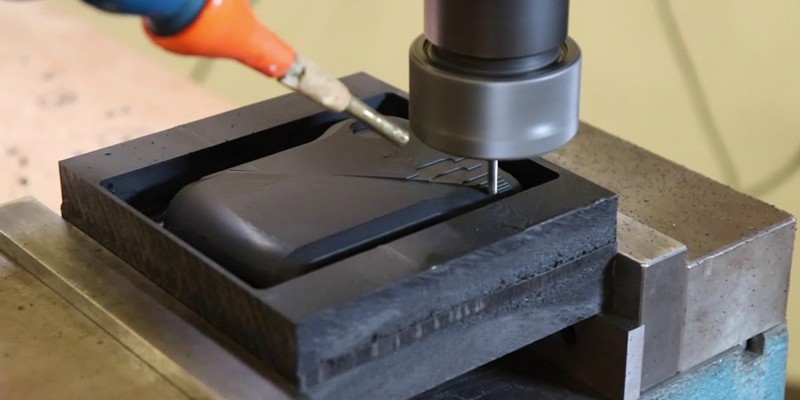- November 24, 2023
Glass-filled nylon is a nylon-based compound with infused glass fibers for enhanced material properties like high strength, rigidity, and thermal stability. It is a CNC-machining material, presenting unique machining properties that are worthy of discussion owing to the growing industrial applications
This article will explain what is glass-filled nylon, its grades, and the benefits and challenges in the machining process.
What is Glass-Filled Nylon?
Glass-filled nylon is a synthetic thermoplastic material with Polyamide (nylon) as the base compound, that is filled with glass fibers or powder particles. The addition of glass gives a considerable boost to nylon’s material properties, both mechanical and thermal. To put things in perspective, some PA+GF variations are up to 80% stiffer than regular nylon compounds.
Due to its favorable qualities, it is widely used by the manufacturing industry in product development, and consumer products, and requires high-intensity applications like automotive and electronics.
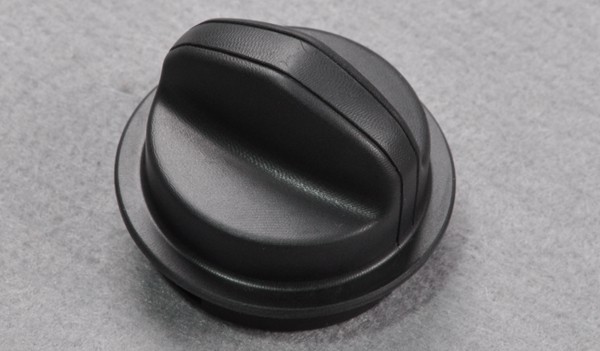
Properties of Glass-Filled Nylon
Glass-filled nylon boasts a range of impressive material properties that make it the favored choice among engineering plastics in many industries. This section explains these properties in detail.
High Tensile Strength
Glass-reinforced nylon is a considerably strong plastic. Depending on its grades, PA+GF variants can have up to 200 MPa tensile strength. Furthermore, this translates to other strength measures as well, like high flexural strength and fatigue resistance.
Low Thermal Expansion
Thermal expansion of glass-filled nylon is significantly less than nylon, meaning that it resists thermal deformation errors like warping much better. Owing to this, PA+GF grades are suitable for high-temperature applications in the automotive industry and components with electric circuits.
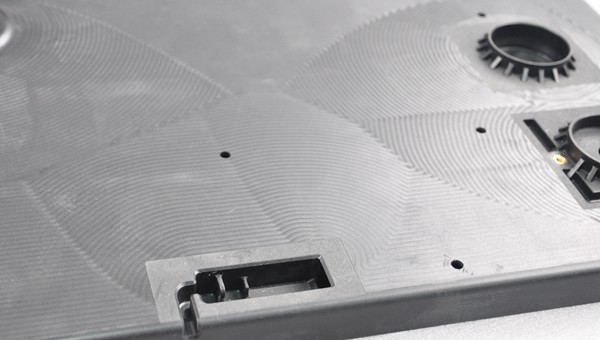
Improved Thermal Stability
Thermal stability is another quality that glass-reinforced nylon exhibits. This means that it holds its material properties like strength and hardness throughout a large temperature differential.
Not only does this translate to a high degree of dimensional stability, but also keeps performance at different temperatures, making it a great plastic choice for different applications.
Low Creep Properties
Creep resistance is a critical property for load-bearing parts. Over time, mechanical load tends to induce permanent deformation in materials, further coupled with a loss of mechanical performance.
This is a common problem with some engineering plastics, which are softer and have low creep resistance in general. Glass-filled nylon stands out as one of the best plastic materials for creep performance, allowing its use in static load applications like enclosures and consumer products.
Good Material Damping
Damping is the property of a material to absorb shock loads and resist vibration. This is essential in vibration-sensitive applications like automotive components, home appliances, and circuit enclosures. The high material damping of PA+GF variants is one of its strong points.
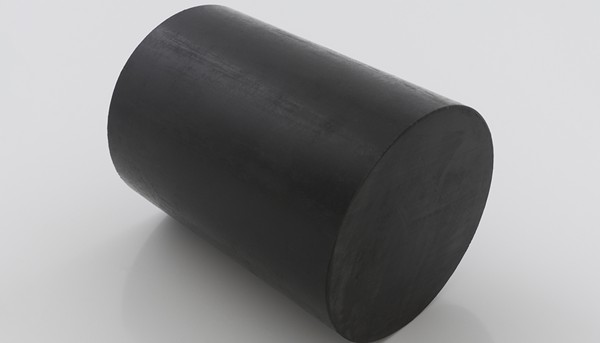
Grades of Machined Glass-Filled Nylon
Glass-reinforced nylon comes in numerous grades, each with its own unique mix of qualities and uses. We will discuss below to give a general idea of how they differ.
PA 6/6 GF
PA 6/6 GF includes 15-50% glass in a base material of PA 6/6. It exhibits excellent mechanical and thermal properties including rigidity, impact resistance, moisture absorption, and thermal stability. Furthermore, this grade of glass-filled nylon has exceptional dimensional stability, making it suitable for precision applications.
This grade is a good choice for producing load-bearing components like pulleys and machine elements.
PA 6 GF
PA 6 GF employs Nylon 6 (PA 6) as the base compound with up to 15-45% glass ratio. The addition of glass fibers improves mechanical performance, moisture absorption, and impact resistance.
Due to these high-performance qualities, its common uses include ducting, plastic enclosures, and engine guards.
PA 12 GF
This grade of glass-reinforced nylon has PA 12 as the base compound, with glass ratios going up to 30%. It has a different base material than the previously discussed PA 6-based grades, the material properties are also more inclined towards PA 12.
PA 12 has a higher chemical resistance and moisture resistance compared to PA 6 but also has less strength and melting temperature. It is also more flexible. Therefore, PA 12 GF is a good choice when an application demands high chemical stability and mechanical performance can be compromised.
PA 46 GF
PA 46 GF is a high-performance glass-reinforced nylon grade, boasting excellent strength, thermal stability, wear resistance, and low water absorption. It stands out among other pa+gf grades in most material properties, making it ideal for applications like electric motor components, circuit breakers, sensors, and automotive parts.
PA 6/6 GF FR
PA 6/6 GF FR is a very special glass-reinforced nylon grade with flame retardant (FR) capabilities. In addition to having the same qualities as the aforementioned PA 6/6 GF, it boasts low flammability, which is not common in nylon-based material groups.
Its low flammability adds an extra layer of safety in applications with fire hazards, like electric circuits and household appliances. Moreover, it also serves as a good material choice for automotive and aviation parts in close vicinity of components with ignition risks.
Benefits of Using Glass-Filled Nylon for CNC Machining
Glass-filled nylon boasts a great combination of desirable material properties. The main reasons why manufacturers opt for glass-reinforced nylon for machining applications are as follows:
Thermal Stability
Thermal performance is also a major issue in plastic CNC machining. Most materials tend to soften due to low melting points. Glass-filled nylon, owing to its higher thermal stability, retains its properties at high machining temperatures, making it a viable choice for machining. Moreover, it also resists thermal-related issues like warpage.
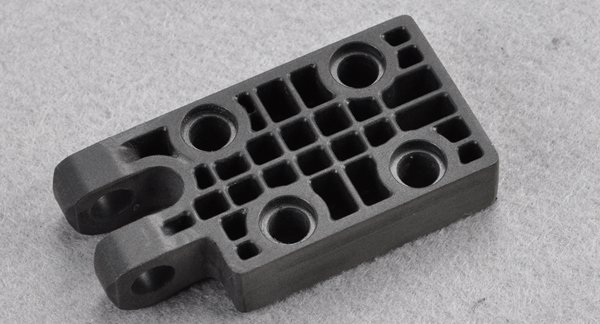
Dimensional Stability
Dimensional stability is of the utmost importance in manufacturing. Plastic parts easily deform during or even after machining, making it difficult to produce them to manufacturing requirements. Glass-filled nylon, due to the additional strength provided by glass fibers, can maintain its shape down to micron levels, making it the perfect plastic CNC machining material.
Impact Strength
Glass-filled nylon, owing to its high strength and hardness, is great at withstanding shock loads without breaking. This ability is highly helpful for CNC machining of plastics, reducing workpiece scrap and material waste.
Challenges and Solutionss in Machining Glass-Filled Nylon Plastics
Glass-filled nylon is an excellent pick for machined plastic parts. However, it presents a unique set of challenges to machinists that must be tackled with tact in order to achieve the desired results.
This section discusses machining glass-filled nylon properties and how to solve these issues during production.
Excessive Tool Wear
The addition of glass into the mix complicates things a lot. Glass-reinforced nylon has remarkable friction and wear properties due to glass fiber, but they are extremely harsh on the cutting tool, causing excessive and quick wear on the cutting edge.
To deal with this, machinists employ hard-cutting inserts like carbide or ceramics. Moreover, cutting-edge preparation also matters a lot. Tools with razor-sharp edges and positive rake perform well on PA+GF.
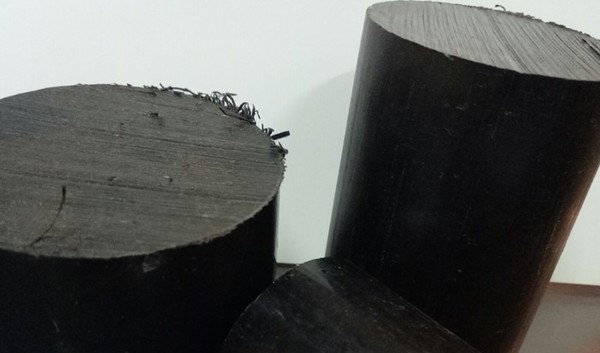
Delamination
Since glass-filled nylon is a composite, delamination is an issue that machinists have to face. Delamination means that the cutting action causes the glass to be pulled out from the nylon, damaging it in the process. Clearly, this is an unwanted scenario that is to be avoided.
To tackle this issue, machinists usually optimize their toolpath to align with the direction that has the lowest delamination risk. For example, drilling operations are performed perpendicular to the lamination orientation to avoid delamination issues.
Applications of Glass-Filled Nylon Machined Parts
Glass-filled nylon has numerous machining applications. Some of these are as follows:
- Gears for low- to medium-intensity loads
- Low-friction bearings
- Fasteners and spacers/washers
- Circuit enclosures
- Home appliance housings and handles
- Power tool housings
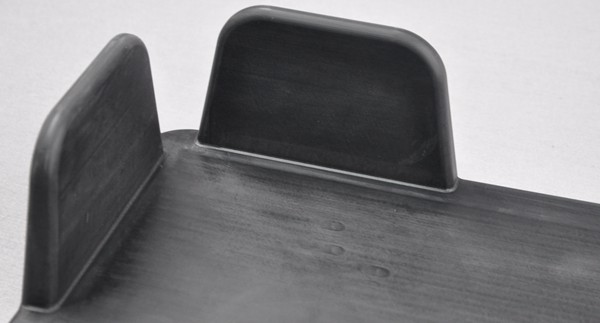
Alternative Methods to Process Glass-Filled Nylon
Machining is not the only mainstream production method for glass-filled nylon. Its suitability for product development purposes means that it is widely popular in rapid prototyping circles. Some of the alternative methods to process PA+GF are as follows:
3D Printing
Glass-filled nylon is one of the exotic composite filaments in 3D printing with admirable mechanical and thermal properties. These qualities are impressive for prototyping jobs where the final product must survive tough conditions like high temperatures or friction.
The main 3D printing method for glass-reinforced nylon is selective laser sintering (SLS). Occasionally, other methods such as multi-jet fusion (MJF) may also be used.
Injection Molding
PA+GF properties are highly suitable for injection molding, a popular method to process engineering plastics. Injection molding produces similar results to machining but may not be able to get some of the complex geometric features.
As with machining, the abrasive nature of glass particles causes issues like mold wear and rough surface finish. Moreover, the anisotropic nature of glass-filled nylon is another problem. It causes the mold filling process to become non-uniform, leading to warpage and uneven shrinkage of the product.
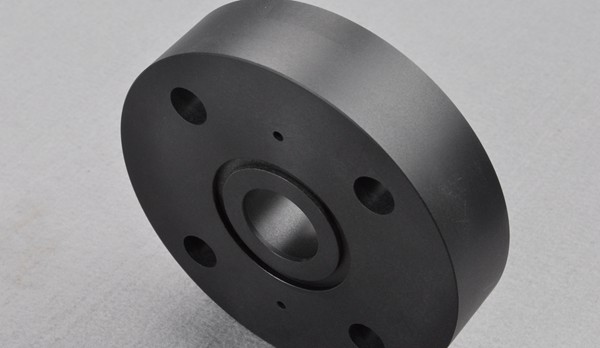
Get Machined Glass-Filled Nylon Parts at WayKen
At WayKen, we take pride in our ability to handle different plastic materials and production requirements, especially our expertise in machining various grades of glass-filled nylon.
Whether you require prototypes or low-volume production, we have machining capabilities, such as CNC milling, turning, 3D printing, injection molding, and surface finishing to deliver your metal and plastic parts. Our team is also committed to following strict standards of the production process, ensuring that each product meets your exact specifications.
With a focus on customer satisfaction and one-on-one support, we are ready to turn your ideas into reality. Contact us today to discuss your project.
Conclusion
Glass-filled nylon is a special material with impressive material properties including high strength, hardness, thermal stability, and creep resistance, making it a standout among engineering plastics. In terms of machinability, it poses challenges like tool wear and biohazardous dust. Taking seriously this process, however, these problems are very manageable.
FAQs
How to choose glass-filled nylon grade for machining applications?
Glass-filled nylon gets stronger and harder with glass fiber percentage, but also more difficult to machine. Thus, when choosing a grade for machining applications, engineers try to find the sweet spot where they get the best mechanical and thermal properties but also do not compromise machining quality and machine life.
What safety precautions are important when machining glass-filled nylon?
Glass-filled nylon produces dust that contaminates the workshop environment and coolant. Adequate ventilation and filtration must be in place to properly deal with this material.
How does glass-filled nylon compare to unfilled nylon?
Glass-filled nylon has better strength, hardness, thermal expansion rate, chemical resistance, creep resistance, and material damping.

